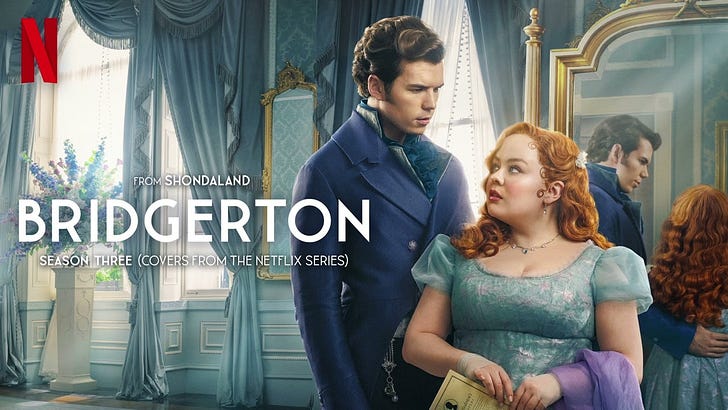The second half of the third season of Netflix’s Bridgerton is about to drop. I love Bridgerton, it’s fun and sexy and entertaining. If you don’t, I honestly do not care. But certain criticisms of the series irk me not because they are “wrong” but because they are arbitrary and, well, snobby. And it’s not just Bridgerton; there’s a whole category of movie/TV complaints that sound “smart” at first, but once you investigate even a little bit, don’t hold up. So let’s unpack that.
Bridgerton is ostensibly set in the Regency era, AKA Jane Austen Times. In the most recent season, a character even mentions reading Emma. Any viewer will immediately see that the show merely gestures at the time period, with candy-colored costumes made of modern fabric and a soundtrack featuring violin covers of current pop songs. It’s a fantasy version of the period, and everyone tuning in knows and accepts that. It also plays fast and loose with history when it comes to race relations, mixing together actors of all ethnicities and proposing an alternate history in which King George III fell in love with a Black woman and opened the door for upper class interracial romance. Again, everyone watching knows this is fiction, and it’s good, escapist fun. We can joke about how Colin traveling abroad during Napoleon’s reign would have been a disaster, but no one is actually bothered by these “inconsistencies,” right?
…right?
Online, you can find a dozen videos and articles separating fact from fiction regarding the wardrobe and other anachronisms. Interesting for those curious about fashion, sure, but presented with a kind of “gotcha!” attitude I’m not sure is warranted. It’s not like the costume department is stupid, they just don’t care that much about hewing to the period. It’s season three, we’ve been through this before.
A friend (whom I like and respect!) told me she found the series hard to get into because the actors have had plastic surgery, which the characters wouldn’t have been able to access at the time. And like, if we’re going down that road…women of the era would not have had perfectly waxed eyebrows or hairless legs or shiny white teeth, either. The makeup would be either nonexistent or deeply off-putting.
It’s a bit of a back-door brag. “I am burdened with knowledge of history such that, alas, I am unable to enjoy Netflix, oh, woe is intelligent me.”
Another hallmark of Bridgerton is that every sexual encounter is vocally, enthusiastically consensual. I don’t think that’s “realistic” but I don’t hear anyone being like, “the show would be better if it was a lot of marital rape!” (Though there are probably some of those people out there.) What does and doesn’t set off our “not real!!!!” alarms seems to change person to person, which is understandable, but makes it impossible for the show to please everyone. Maybe we should ask ourselves, “is this the show’s bugaboo or mine?”
If I may poke another hole in hypothetical arguments…most viewers aren’t well-versed in actual history, they’re just accustomed to a different approximation of it: other movies and shows set in the past.
There’s an illustrative anecdote from the making of A Knight’s Tale, a fun romp starring Heath Ledger and Paul Bettany based oh so loosely on the Canterbury Tales. It’s nominally set in the 14th century but makes no pretense about “accuracy” and includes rock songs and other Y2K touches. When one executive complained about the score sounding too modern, the director asked what kind of music would be better. The executive suggested something orchestral, you know, with pianos and violins. Which also did not exist in the 14th century. But people would have accepted that, because audiences don’t know (or care) when instruments were invented. But the filmmakers figured, if a piano is allowed, why not an electric guitar? The rock songs stayed in, and somehow we all survived.
It’s like The Tiffany Problem. “Tiffany” is so closely associated with the 1980s that the story of a Renaissance noblewoman named Tiffany would probably draw snickers, even though the name has been around since the Middle Ages. Our conception of history trumps actual history more often than not.
See also: there’s anachronistic dialogue all over Mad Men. You’d think this would have bothered people way more than “problems” in anything set centuries ago, since there were Mad Men viewers who were alive in the 60s and presumably remembered how people spoke. But nobody cared because we’re trained to look at 1) costumes 2) race … end of list. Personally, I think Mad Men is better for being legible to its intended audience, but again, what counts as smart criticism versus nerdy nitpicking is entirely arbitrary.
Sometimes what people call out doesn’t even make any sense. Lady Gaga’s Italian accent in House of Gucci caught a lot of flack, and while it was fun to chuckle at (she’s Gaga after all, and it did sound kinda Russian), what I wanted to know was, what would be the point of her doing a “good” accent? In-universe, these people are not speaking Italian-accented English to one another; they are speaking fluent Italian. Ridley Scott was using Italian accents as a shorthand. Pronouncing English words the way a real Italian native would pronounce them if she learned English as a second language had nothing to do with the character. Either the audience “buys in” that English-with-an-accent equals Italian, or it doesn’t. There’s no middle ground where Adam Driver’s accent is another language and Gaga’s isn’t.
(FWIW, I think this was the wrong approach overall. Sofia Coppola didn’t need hokey French accents for Marie Antoinette, and both the Medici Netflix series and Gladiator communicate that they are set in what is now Italy without anyone making a’very e’spicy meat-a-ball)
Moving beyond nitpicking specific elements, I’m also interested in how viewers accept or reject storytelling choices wholesale. More than once I’ve encountered someone who claims they can’t get into musicals because “people don’t burst into song in real life.” No, they don’t. J. Robert Oppenheimer also didn’t live half of his life in black and white. It’s art. No one ever says Ferris Bueller’s Day Off is bad because “no one in real life turns and talks to the camera.” People didn’t fault Once Upon A Time…In Hollywood for having a narrator, even though, if you haven’t noticed, life doesn’t have a narrator. When something is lame (musicals), anything that’s not nitty-gritty-real is too fake to be tolerated. But for cool projects like the adventures of teenage delinquents or the alternate history of the Manson Family, meta-narrative devices are A-O-K.
Arbitrary.
And listen, if you’re all-in on stories told out of order but you can’t stand dream sequences or whatever your personal taste is, fine. But I’ve seen people try and police what others are allowed to accept or reject as “too much” in a movie, and there’s just no word for it but snobbery. Laughter is an involuntary reaction, and sometimes people laugh at old movies, yet this is somehow offensive to (some) people who love old movies. Here’s an Indiewire story on the topic from 2012, which links to other stories, though the links are broken. The article mentions laughing at Singing In The Rain, which is a comedy, so I’m not entirely sure what the problem is…
Here’s a more recent brouhaha:
I can believe that a portion of the laughing audience is doing so because they are uncomfortable with the “cringe” and too cynical to watch the classics. But I think there’s another piece of the puzzle that these (ahem, mostly white, male) critics are overlooking: some old movies are dated as fuck.
HAVE YOU HEARD JIMMY STEWART TALK LATELY????
WHAT????
There’s this thing that happens where, once you see a spoof of something, it’s hard to see the original without thinking of the spoof, and it makes you laugh. No one talks like Jimmy Stewart anymore, but everyone can do an impression of him, so now hearing him is kinda funny. In twenty years, we will laugh at Christopher Walken.
Most of us grew up seeing parodies of Hitchcock on SNL and elsewhere long before we ever saw a Hitchcock movie. So when we watch Vertigo, it lights up the part of our brains that remembers the spoof, and we laugh. That’s normal. The Twilight Zone theme is used as a punchline constantly. You hear it, you giggle. That’s normal. I love the movie Walk The Line. I also love the movie Walk Hard. If I watch Walk Hard and then the next day I watch Walk The Line, I will probably laugh through the first half of Walk The Line. Anyone who can’t understand this is…yeah, snobby.
(See also: many older horror films are less scary to modern audiences because we are more desensitized to blood and violence now, and if you’re like, “no, the original Halloween made me vomit,” either you’re lying or you don’t watch the news. It’s okay that you were born when you were born.)
There’s an easy “fix” here, which is to watch a few more old movies so you get used to the style. And maybe if critics responded to less sophisticated audiences with a helpful “here’s a list of only semi-dated movies to help you develop an appreciation for the classics” instead of a snide “it’s not funny, actually,” we’d all be better off.
But who wants to be generous when being superior is so much funner?
So, what, exactly, is my point here? You’re an elitist if you don’t love Bridgerton? No, you can like whatever you want. You can find issues with whatever you want. The task of any show or movie is to make you believe that the world it exists in is or could be real, which includes meeting audience expectations for that world. So if anachronisms or illogic stick out to you, that’s the fault of the storytellers. And there are definitely stories that just do not make sense, even on their own terms.
I’m not saying lower your bar for fluff (that’s rude) and I’m also not saying “never nitpick,” because sometimes ya gotta.
What I’m saying is…I really fucking hate it when people try to make clever arguments that aren’t real!
That’s literally it.
I’m complaining!!!!!!
Because I get so annoyed!!!!!!!
Sex And The City is not a show about how to make it as a writer, so while Carrie’s apartment is unrealistic, it is not a world-breaker. They’re interns for the first three seasons of Grey’s Anatomy, who the hell cares? Watching a show or movie is not a TRIVIA CONTEST and I’m sick of justifying stuff like Bridgerton by asking people to overlook certain elements. We all overlook stuff all the time; if you don’t know how to do that already, you’re too stupid to watch television, not too smart.
For god’s sake, there’s an actual debate over whether or not Citizen Kane is premised on a plot hole.
Scoffing at musicals, laughing at classics, scratching your head at anachronisms, all of these reactions are predicated entirely on what you’ve seen before, and most likely, what your parents showed you while you were growing up, so don’t crow about your Innately Good Taste when you’re a product of your environment just like everybody else.
And on that bitchy note,
Lizzie





